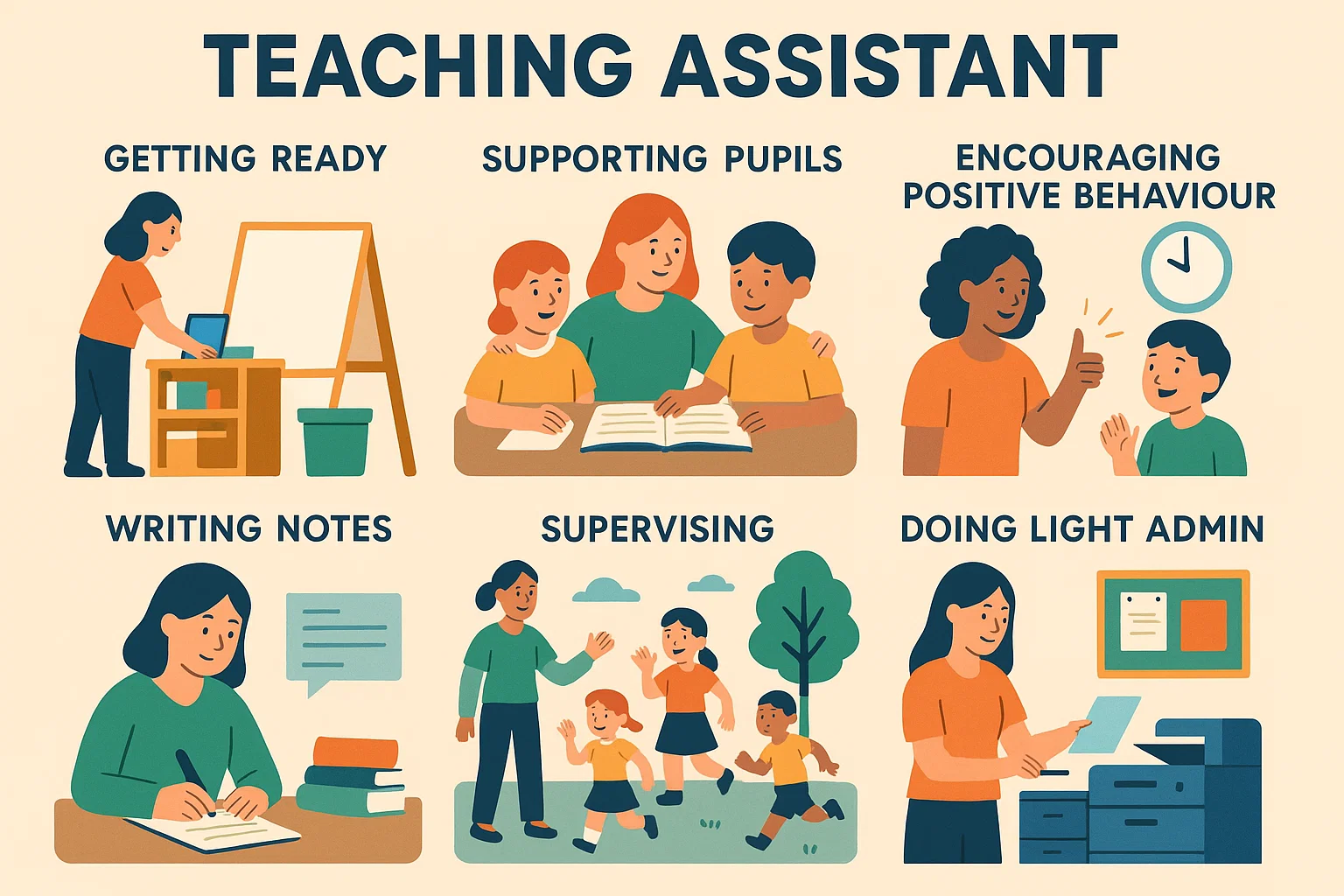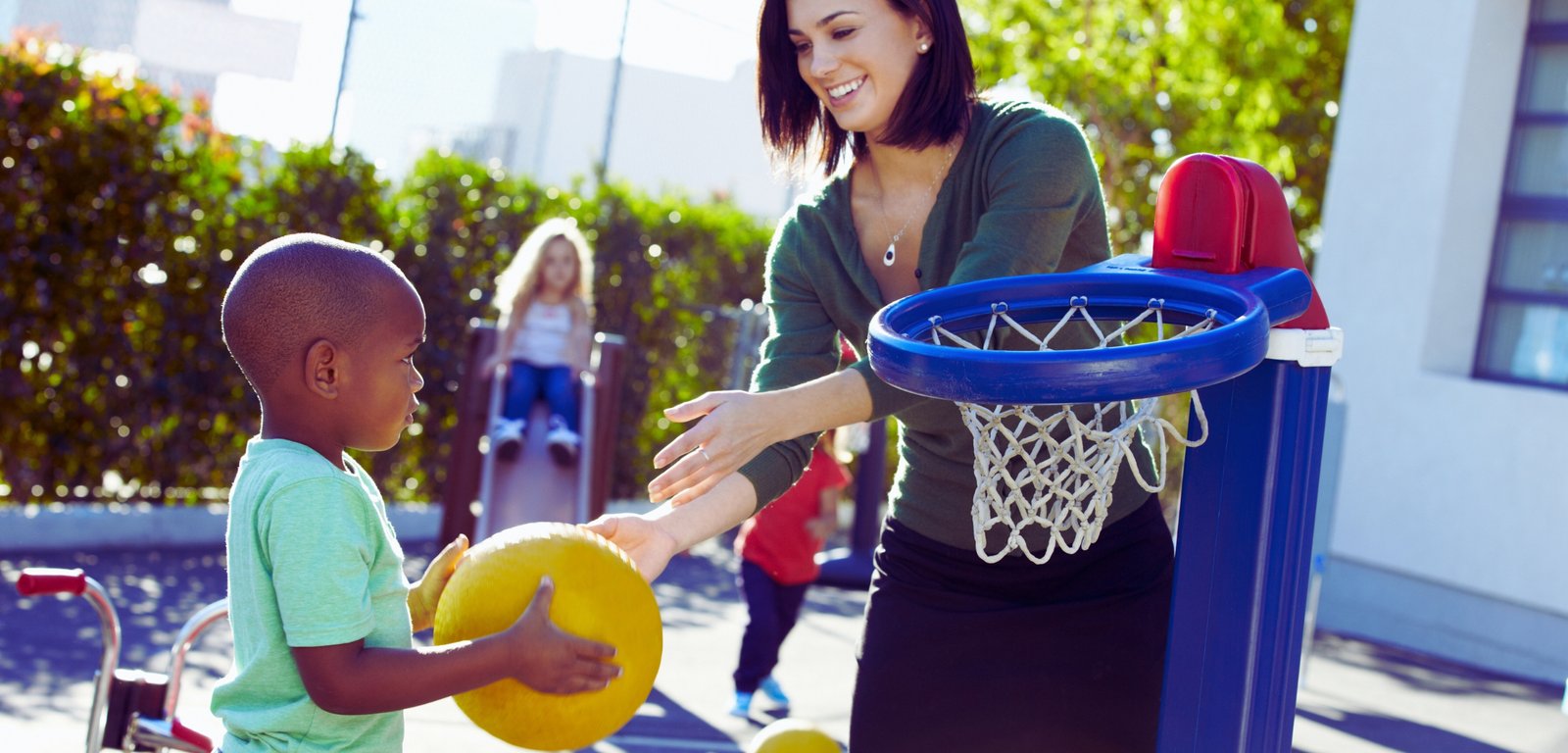No products in the cart.
Ever wondered what do Teaching Assistants do day to day? In classrooms across the UK, they’re the quiet heroes who keep learning on track. According to the Department for Education, there are now over 280,000 Teaching Assistants working in schools — proof of just how essential they’ve become to modern education.
They’re the calm voices when lessons get lively, the extra pair of hands when teachers need support, and the reassuring presence that helps children feel safe and confident to learn. Whether it’s helping with reading groups, supporting pupils with special needs, or simply keeping the classroom running smoothly, TAs make a real difference every single day.
In this friendly 2026 UK guide, we’ll explore what Teaching Assistants actually do, the skills that make them great, and why their role matters more than ever in today’s schools.
What Is the Role of a Teaching Assistant?
A Teaching Assistant (TA) is there to make learning easier, smoother, and more supportive for everyone in the classroom. They work closely with teachers to help pupils learn effectively, behave positively, and feel safe and included in school life.
Most Teaching Assistants work term-time only, meaning they’re in school during term dates and have holidays off. Their duties often include following school policies on behaviour, special educational needs (SEND), and safeguarding — and always reporting any concerns straight to the Designated Safeguarding Lead (DSL).
In short, a TA’s role is to support both teachers and pupils, creating a calm, caring environment where learning can truly flourish.
Ever Wondered What Do Teaching Assistants Do Every Day in School?
Every day is different when you’re a Teaching Assistant! Some days you’re helping a small group with reading, and other days you’re running around making sure everyone’s ready for maths.
Here’s what a TA usually does day to day:
- Walk around the classroom to check how pupils are doing.
- Explain tasks in clear, simple steps.
- Work with small groups or one-to-one on reading or maths
- Keep pupils focused and on task.
- Reset resources and tidy up for the next lesson.
- Share quick updates with the teacher about how pupils are doing.
So, when people ask what teaching assistants do, the answer is: they do a bit of everything that keeps the classroom calm, fun, and productive!
Main Duties of a Teaching Assistant

TAs do a lot of behind-the-scenes work that keeps lessons running smoothly. In fact, they’re part helper, part organiser, and part cheerleader. They are always ready to support pupils and teachers in whatever is needed. Even though their work might not always be in the spotlight, it makes a big difference in how lessons flow. As a result, children are able to learn more effectively and feel supported throughout the day.
Main duties include:
- Getting resources, devices, and learning areas ready
- Supporting pupils in small groups or one-to-one
- Encouraging positive behaviour and calm routines
- Writing short notes or reading logs for the teacher
- Supervising at break, lunch, and during trips
- Doing light admin like photocopying or helping with display boards
- Sometimes marking simple tasks following the teacher’s instructions.
It may not always be glamorous, but every task helps pupils learn better and teachers teach better.
What Does a Teaching Assistant Do in Primary Schools?

TAs are very important in primary schools. They help children learn reading, writing, and counting. They also build confidence and independence.
Here’s what they do:
- Help with phonics, reading groups, and number work.
- Support play-based learning and creative tasks.
- Guide children through daily routines like lining up or tidying up.
- Give quick handover messages to parents if asked by the teacher.
- Encourage pupils to become more independent little by little.
It’s a lovely stage to work in; every smile and small success really means something.
What Does a Teaching Assistant Do in Secondary Schools?
In secondary schools, Teaching Assistants support older students in subjects like English, maths, and science. Because classes are bigger, TAs often focus on helping pupils who need extra guidance.
Typical duties include:
- Supporting learning in specific subjects
- Helping pupils take notes or understand tricky topics
- Managing behaviour and transitions between lessons
- Assisting with exam access (as a reader or scribe, if trained)
- Encouraging pupils to stay motivated and focused
Secondary TAs help teenagers feel capable and supported, especially those who find school challenging.
What Does a Teaching Assistant Do for SEN Students?
Many Teaching Assistants work with pupils with Special Educational Needs (SEN). These TAs are calm, patient, and skilled at helping children in ways that work best for them.
Here’s what they do:
- Follow each child’s IEP or EHCP plan.
- Use visuals, now-and-next boards, and timers to keep learning clear.
- Break tasks into smaller, manageable steps.
- Support sensory or movement breaks when needed.
- Use communication tools like picture cards or devices (if trained)
- Record clear, factual notes for the teacher or SENCO
TAs in SEN roles help every pupil feel understood, respected, and included, and that’s truly special. If you’re inspired by this kind of work and thinking about stepping into the classroom yourself, you can learn exactly how to get started with the “How Do I Become a Teaching Assistant?” guide by Open Learning Academy.
Classroom Support: How TAs Help Teachers Every Day
Teaching Assistants are every teacher’s right hand. They help lessons start on time, keep pupils on track, and make sure no one is left behind. They also notice small problems early and give extra support. This way, the classroom runs more smoothly, and both teachers and pupils can focus on learning.
Daily teacher support includes:
- Setting up and tidying classrooms
- Managing equipment and helping with group work
- Supporting the start and end of lessons
- Keeping notes on which pupils met the learning goal
- Reporting any wellbeing or safeguarding concerns right away
With a TA, teachers can focus more on teaching, and pupils can focus more on learning.
Beyond the Classroom: Extra Roles Teaching Assistants Take On
TAs don’t only help in the classroom. They also help with clubs, trips and simple admin tasks. This way, the school runs smoothly and pupils get extra support. Because of them, the school feels safe, organised, and welcoming for everyone.
Extra roles may include:
- Helping with breakfast or after-school clubs
- Supporting reading or homework groups
- Joining school trips and events
- Doing simple admin or data tasks
- Providing short-term cover if they’re HLTA-trained
These extra touches make the school feel more connected and caring for everyone.
Key Skills Every Good Teaching Assistant Needs
You don’t have to be perfect to be a great Teaching Assistant — you just need patience, empathy, and a genuine desire to help. Still, a few key skills can make all the difference in how effectively you support both pupils and teachers.
Clear and Calm Communication
Good communication is at the heart of being a TA. Whether you’re explaining a tricky task, calming a frustrated pupil, or sharing updates with a teacher, your words need to be clear, kind, and calm.
Patience and Empathy
Every child learns differently, and some days are tougher than others. A great TA stays patient, listens carefully, and understands how a pupil feels — even when things don’t go as planned.
Teamwork and Organisation
TAs work side by side with teachers and other staff, so teamwork is essential. Being organised — from preparing materials to managing time — helps the whole classroom run smoothly.
Basic IT Skills
From interactive whiteboards to learning apps and printing worksheets, technology is part of everyday school life. Having a few basic IT skills makes your work quicker and more efficient.
A Safeguarding Mindset
Keeping pupils safe is everyone’s responsibility. A good TA knows how to notice, record, and report any concerns, always following the school’s safeguarding procedures.
Being steady, kind, and reliable matters most. When pupils trust you, they feel safe and valued — and that trust helps create a classroom where confidence grows and learning thrives.
How Teaching Assistants Support Learning and Wellbeing

TAs do more than help pupils learn; they help them believe in themselves. They’re often the friendly faces pupils turn to when they need a bit of encouragement.
They do this by:
- Praising pupils for specific effort and progress
- Teaching problem-solving (‘What can you try next?’)
- Modelling kindness and teamwork
- Creating a calm, predictable space for learning
When pupils feel supported emotionally, their confidence and focus improve naturally.
Career Growth: How TAs Move Into HLTA or Teacher Roles
Being a TA can be the start of a great career in education. Many Teaching Assistants become Higher Level Teaching Assistants (HLTAs) or even fully qualified teachers.
Typical career steps:
- A Teaching Assistant’s career often begins at Level 1, moves through Levels 2 and 3, and can progress to HLTA with added responsibilities.
- Specialise in SEN, ELSA, or SEMH support
- Work towards a QTS or a PGCE to become a teacher.
- Take short training courses (CPD) in safeguarding, phonics, or ADHD support.
With each step, your skills enhance, and so does your impact in the classroom.
Money Matters: Teaching Assistant Salary
You’ve learnt about all the duties of a Teaching Assistant. Now let’s talk about salary.
Most TAs in the UK start with around £18,000 to £22,000 a year. As you get more experience, or become a Higher Level Teaching Assistant (HLTA), you can earn £23,000 to £28,000 or more. For example, TAs who work with SEN pupils or have special skills may earn a little extra. Also, many TA jobs are term-time only, so the pay is for school months.
The salary is one part of the job. The best part is gaining experience, learning new skills, and helping children daily.
Final Thoughts: Why Teaching Assistants Are So Important in Schools
So, what do Teaching Assistants do? In response, we can say, ‘They make learning possible for everyone.’ They’re the quiet heroes who spot a pupil struggling, encourage at the right time, and help teachers create classrooms full of kindness and focus.
Teaching Assistants amplify a teacher’s impact by bringing more eyes, more support, and more care to every lesson. Their support helps children feel confident and ready to learn.
If you enjoy helping others, take the Teaching Assistant Course at our Open Learning Academy. Start learning today and become the steady, caring influence a classroom needs!




